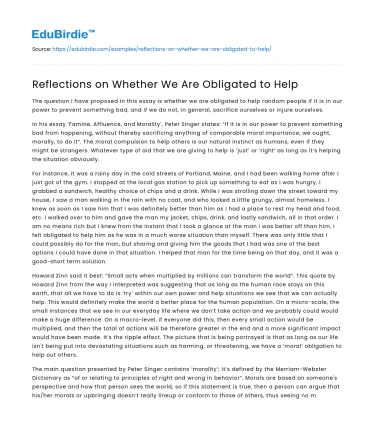The question I have proposed in this essay is whether we are obligated to help random people if it is in our power to prevent something bad, and if we do not, in general, sacrifice ourselves or injure ourselves.
In his essay ‘Famine, Affluence, and Morality’, Peter Singer states: “If it is in our power to prevent something bad from happening, without thereby sacrificing anything of comparable moral importance, we ought, morally, to do it”. The moral compulsion to help others is our natural instinct as humans, even if they might be strangers. Whatever type of aid that we are giving to help is ‘just’ or ‘right’ as long as it’s helping the situation obviously.
Save your time!
We can take care of your essay
- Proper editing and formatting
- Free revision, title page, and bibliography
- Flexible prices and money-back guarantee
For instance, it was a rainy day in the cold streets of Portland, Maine, and I had been walking home after I just got of the gym. I stopped at the local gas station to pick up something to eat as I was hungry, I grabbed a sandwich, healthy choice of chips and a drink. While I was strolling down the street toward my house, I saw a man walking in the rain with no coat, and who looked a little grungy, almost homeless. I knew as soon as I saw him that I was definitely better than him as I had a place to rest my head and food, etc. I walked over to him and gave the man my jacket, chips, drink, and lastly sandwich, all in that order. I am no means rich but I knew from the instant that I took a glance at the man I was better off than him. I felt obligated to help him as he was in a much worse situation than myself. There was only little that I could possibly do for the man, but sharing and giving him the goods that I had was one of the best options I could have done in that situation. I helped that man for the time being on that day, and it was a good-short term solution.
Howard Zinn said it best: “Small acts when multiplied by millions can transform the world”. This quote by Howard Zinn from the way I interpreted was suggesting that as long as the human race stays on this earth, that all we have to do is ‘try’ within our own power and help situations we see that we can actually help. This would definitely make the world a better place for the human population. On a micro-scale, the small instances that we see in our everyday life where we don’t take action and we probably could would make a huge difference. On a macro-level, if everyone did this, then every small action would be multiplied, and then the total of actions will be therefore greater in the end and a more significant impact would have been made. It’s the ripple effect. The picture that is being portrayed is that as long as our life isn't being put into devastating situations such as harming, or threatening, we have a ‘moral’ obligation to help out others.
The main question presented by Peter Singer contains ‘morality’; it’s defined by the Merriam-Webster Dictionary as “of or relating to principles of right and wrong in behavior”. Morals are based on someone's perspective and how that person sees the world, so if this statement is true, then a person can argue that his/her morals or upbringing doesn’t really lineup or conform to those of others, thus seeing no moral obligation to genuinely help others. To rebuttal that argument, there are so many threatening things in this world that we live in every day. It is of the utmost importance that our help is required. Therefore, we cannot just sit back and be a bystander to all of the things that are happening around us and just let everything unfold by itself and not have any influence on some outcomes that we can control.






 Stuck on your essay?
Stuck on your essay?

